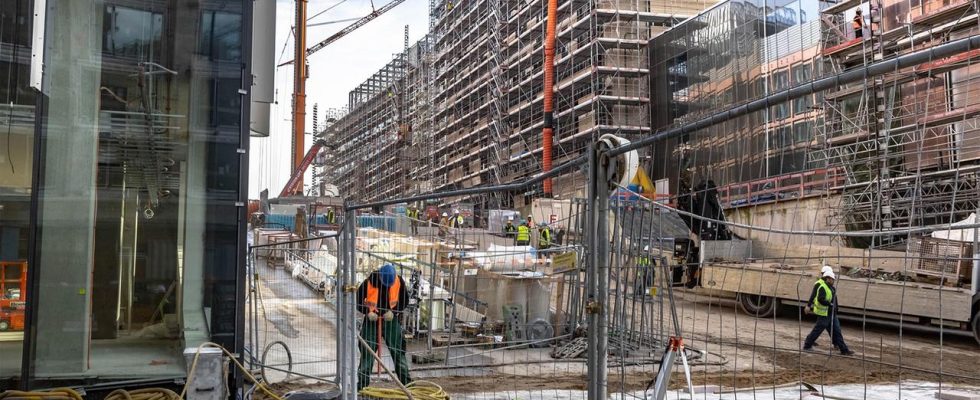background
The housing construction industry continues to decline – even though the shortage is getting worse. Experts and association representatives warn of the economic and social consequences.
Ralf Stockschläder walks across the yard of his building materials company JASTO in the north of Rhineland-Palatinate. Until the end of 2022, his company produced paving and concrete blocks for one- and two-family houses almost all day long, says the company boss. “The operation was at full capacity for years because construction was booming. Since the beginning of 2023, our production has collapsed by 80 percent. We are a crisis barometer for the entire industry,” explains Stockschläder. He has been running the company for almost 30 years, but he says: “I have never experienced such a rapid and massive collapse.”
Back then – in the spring of last year – Stockschläder had to act quickly to keep his employees. The production of the stones had to be reduced – from three layers to just one. Since then, the employees have been working in the horticultural sector, another division of JASTO. “In horticulture, our private customers invest up to 30,000 euros from their savings. That’s going well. Almost no one wants to take out large loans to build a house. People are deeply insecure,” said the 57-year-old company boss.
The main reason is the federal government’s policy. “Laws are suddenly changed, funding programs are canceled or made far too tight,” says Stockschläder. Due to ever new requirements and bureaucracy, the construction of new single- and multi-family homes is practically unaffordable. “The company can bridge the crisis through horticulture. This is how we keep our skilled staff. I don’t see a significant number of new living spaces in Germany at the moment,” says Stockschläder, drawing a sobering conclusion. The general conditions are simply too bad.
Construction industry is a significant one Economic factor
The practical assessments are supported by a new study by the German Institute for Economic Research (DIW). The scientists prepared the analysis for the German Housing Association. The title: “The economic power behind housing construction”. After that, this area has been declining since 2021. For this year, the DIW even calculates a drastic drop of 5.4 percent.
The crisis in construction will therefore also have consequences for economic growth in the Federal Republic as a whole, because the construction industry has a similar economic weight as the automotive industry. Last year, the construction industry generated almost 537 billion euros. Around one in seven jobs in Germany is related to the housing construction industry. The consequences for taxes are also enormous: If the expected slump occurs, it would mean a significant loss of almost five billion euros in tax revenue for the state compared to the previous year.
Ecological and social significance of the industry
The study also sheds light on the industry’s ecological responsibility in relation to the goal of climate neutrality in 2045. The construction sector plays a key role here. Comprehensive renovations such as better use of energy, insulation, building control and switching to emission-free energy sources such as photovoltaics are necessary. According to forecasts, an annual renovation rate of at least 1.8 percent of the housing stock is necessary – a level that has not been reached in recent years and is unlikely to be achieved in the foreseeable future.
The study also addresses social issues. As a result of the slump in housing construction, rents would continue to rise. One in six tenant households (3.1 million) already pay more than 40 percent just for the gross rent: half of them even have to spend 50 percent or more on housing. The rising additional costs such as heating and energy would also be added. Since the population in Germany will continue to increase in the coming years, further tightening can be expected.
The DIW comes to an alarming conclusion: “If this trend continues, housing construction will only be unable to adequately fulfill its socially equalizing function in the future.” The current demand in the Federal Republic is more than 800,000 apartments. These are the results of another study presented by the building research institute ARGE at the Housing Construction Day.
Lack of housing means Shortage of skilled workers
Robert Feiger is federal chairman of IG Bau. The industrial union is part of the alliance that organizes the housing construction day. Feiger is also worried about the long-term consequences for the labor market: “We have a shortage of skilled workers and so we need workers. But they will only come if they find an apartment that they can afford. And that’s why everything is failing at the moment,” said the union boss . “Regardless of whether they are skilled workers from Germany or immigrants from abroad: anyone who wants to work in big cities and metropolitan areas has little chance of finding an affordable apartment.”
The IG Bau boss cites a huge price increase over the past four years as the main reason for the crisis. Since then, costs have increased by 42 percent. The price driver is primarily the technology in the buildings: heating, ventilation, plumbing and electrical engineering. The legal standards would therefore have to be lowered so that construction could be easier.
But that alone won’t be enough. “Housing construction needs a total of 23 billion euros in immediate funding per year – namely 15 billion euros for 100,000 new social housing units. And an additional eight billion euros for the construction of 60,000 affordable apartments,” says Feiger, referring to the study by the building research institute ARGE. The shortage is great: 9.3 million people in Germany already live in overcrowded apartments. People with low incomes, single parents, singles and pensioners are particularly affected. The union leader speaks of a division in society and warns politicians: “This is social explosive.”
Oliver Neuroth, ARD Berlin, tagesschau, April 11, 2024 10:53 a.m

